Lake Worth Addiction Treatment & Mental Health Resources Guide
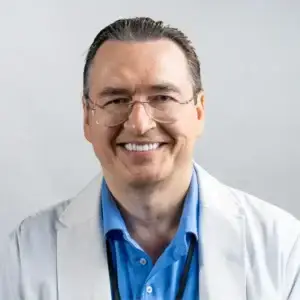
Dr. Rostislav Ignatov, MD
Chief Medical Officer
Lake Worth continues to face a serious addiction crisis that looks different across its Hispanic, White, and Black neighborhoods. At the same time, the city has built a strong network of care—linking medical detox centers, peer support programs, culturally tailored services, medication-assisted treatment (MAT), and certified sober homes. Public and private providers work side by side, creating multiple entry points for patients who need help.
The numbers show just how urgent the problem is. In 2021, the 33460 ZIP code recorded 35 overdose deaths, equal to 138 deaths per 100,000 residents—more than twice the county average. Palm Beach County as a whole reported 525 fatal opioid overdoses in 2021 and nearly 1,500 total overdoses in 2022. Yet fewer people are entering formal treatment, even as mobile crisis teams and outreach staff hold thousands of community events each year. With 17.5% of Lake Worth residents living in poverty, those in lower-income neighborhoods continue to face the steepest barriers to care.
This guide helps Lake Worth residents and families understand local addiction and mental health resources — including recent statistics, youth mental health trends, and available treatment options across Palm Beach County. It also explains what to look for in professional care and how programs like The Haven Detox – Florida provide safe, evidence-based treatment in a supportive environment.
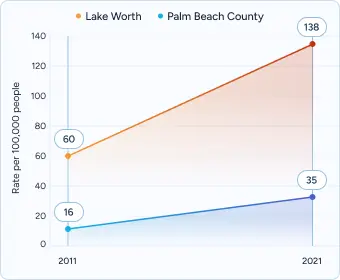
In 2021, Lake Worth’s overdose rate reached 138 per 100,000 people—nearly four times the Palm Beach County average of 35 per 100,000. A decade earlier, Lake Worth was recording roughly 60 per 100,000 and the county average hovered around 16 per 100,000, meaning both local and countywide rates have more than doubled over ten years.
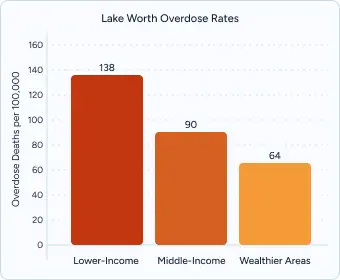
In 2021, lower‐income neighborhoods in Lake Worth saw overdose rates around 138 per 100,000 people, while more affluent areas closer to the beach recorded about 64 per 100,000. Surrounding middle‐income communities averaged nearly 90 per 100,000. This means residents in the poorest parts of town were more than twice as likely to suffer a fatal overdose as those in wealthier neighborhoods.
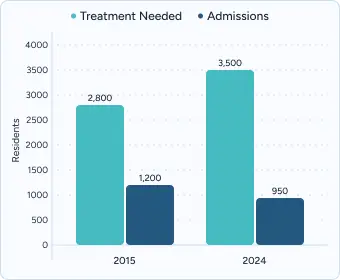
Despite new funding, fewer people are entering formal rehab in Lake Worth. In 2015, approximately 1,200 residents began substance use treatment annually, while in 2024 just 950 did. Meanwhile, estimates suggest around 2,800 people needed treatment in 2015 compared with roughly 3,500 needing services in 2024—highlighting a widening gap between demand and actual admissions. In 2024, the Health Care District placed 254 families in programs, and outreach teams logged over 1,000 community visits, showing awareness has grown but enrollment still lags.
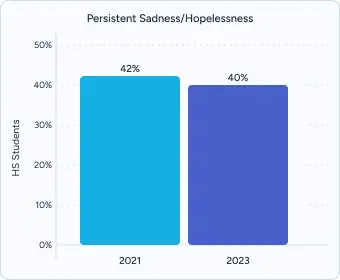
Florida high school data show sustained strain but slight improvement: 40% reported persistent sadness or hopelessness in 2023, down from 42% in 2021. Locally, 71% of Palm Beach County youth say they know where to get help and 57% would feel comfortable talking about mental health.
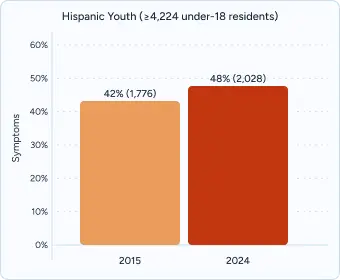
Hispanic youth, who number around 4,224 (48% of under-18 residents), saw symptom rates climb from 1,776 (42%) in 2015 to 2,028 (48%) in 2024. In low-income families—about 2,640 children—symptom prevalence surged from 1,056 (40%) to 1,452 (55%). Despite these rising needs, culturally tailored services for Spanish speakers and economically disadvantaged families remain scarce.
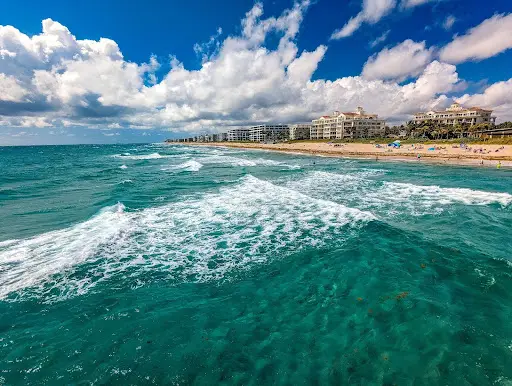
Lake Worth addiction treatment centers address immediate needs across neighborhoods.
Health Care District of Palm Beach County serves as a centralized access point for treatment information and referrals. The program includes behavioral health services and substance use disorder treatment, distributing over 500 MAT doses monthly in 2024.
The 211 Palm Beach County Crisis Team provides 24/7 crisis intervention, covering Lake Worth, West Palm Beach, and surrounding communities. With locations accessible via PalmTran routes and mobile response capabilities, it offers crisis counseling, mental health referrals, and a comprehensive resource database.
Transportation accessibility through PalmTran links all neighborhoods to Lake Worth drug rehab programs and mental health facilities. Route 88 provides access to the Delray Beach area, while Routes 1 and 2 connect downtown to areas like West Palm Beach. The Connection paratransit service offers specialized transportation for individuals with disabilities at $3.50 per one-way trip.
Florida Medicaid covers 100% of treatment costs for qualified residents, including medical detox, residential treatment, outpatient therapy, and approved medications like buprenorphine and naloxone. As of 2024, copayments have been eliminated for behavioral health services, extending coverage to residents up to 138% of federal poverty level.
Florida KidCare offers coverage for eligible children and adults, ensuring access to crisis services and ongoing support. Residents can enroll via the Florida Department of Health online portal or by calling 211, with applications available in Spanish, Creole, and English.
Sunshine Health provides state-funded financial assistance for individuals not eligible for Medicaid or CHIP, up to 200% of federal poverty level. Apply through regional DCF offices or online, with support materials in multiple languages.
Palm Beach County Health Access Program offers wraparound funding and navigation services for uninsured residents. Visit the Health Care District website at hcdpbc.org or call 561-642-1000 to find public treatment slots and support resources across community agencies.
These Lake Worth treatment centers also offer tailored aftercare planning—linking clients with outpatient therapy, peer support groups, and sober-living options—and leverage telehealth follow-ups to ensure continuity of care. Clients benefit from integrated dual-diagnosis services, on-site psychiatry, and holistic wellness programs such as yoga and nutritional counseling.
Private programs in Lake Worth remove barriers to care by providing free insurance checks, full clinical evaluations, and on-site medical detox when needed.
Most centers verify insurance within 48 hours and can admit eligible clients the same day when clinically appropriate.
Lake Worth’s mental health network offers services for depression, anxiety, and dual-diagnosis support in Northwood, South Palm Beach, and the Federal Highway corridor. Providers deliver culturally competent care with bilingual clinicians and trauma-informed therapies tailored to Hispanic, Caribbean, and other multicultural communities.
Families First of Palm Beach County operates community clinic counseling and mobile therapy units focused on Hispanic and Caribbean residents, providing bilingual support. The Lord’s Place offers peer-led recovery circles and faith-based counseling for chronically homeless individuals, integrating substance use and mental health treatment in each program.
The Haven Detox – Florida serves Lake Worth and greater Palm Beach County with immediate access to evidence-based treatment. The facility offers a comprehensive approach that combines proven clinical therapies—such as Cognitive Behavioral Therapy (CBT) and Dialectical Behavior Therapy (DBT)—with a range of holistic and innovative healing options.
Our specialized services include:
With 24/7 medical detox supervision and one of the highest staff-to-client ratios in South Florida, the West Palm Beach location offers both short-term detox and residential programs. Clients experience a resort-style environment featuring professionally catered meals, a fully equipped gym, a game room, and outdoor recreation areas.
The Haven serves individuals with co-occurring substance use and mental health disorders and accepts most major insurance plans, including Florida Blue, Cigna, Aetna, Medicaid, and TRICARE. Transportation assistance is available throughout Palm Beach County to ensure seamless access to care.
Rebel Recovery Community Organization (400 N Congress Ave, Suite 130) offers free peer-led recovery groups, harm-reduction coaching, and social events. Culturally responsive programming is accessible via PalmTran, with evening and weekend hours and active social media engagement.
Peer Place Support Center/MHA of PBC (2100 45th Street, Suite B12) hosts nearly 100 monthly support groups, including AA/NA Saturdays and creative workshops like jewelry making. Staffed by trained peers, it operates as a drop-in hub for mindfulness and recovery planning.
The Lord’s Place Peer Specialist Program provides countywide peer-to-peer services for chronically homeless individuals. Peer-led housing and coaching improve stability. At The Lord’s Place, 77% of residents in recovery avoided relapse while housed in 2023–2024, and 95% were no longer homeless by year-end.
Florida Association of Recovery Residences (FARR) homes comply with National Alliance for Recovery Residences (NARR) guidelines, ensuring independent inspections, detailed applications, and on-site assessments for safety and quality.
Resilience Recovery Resources offers FARR-accredited sober living for young adult males in Old Northwood. Amenities include 24-hour supervision, keyless entry, WiFi, and community transport. House rules require weekly meetings, 12-step participation, and job-hold responsibilities.
Jane’s Way Sober Living provides NARR-standard transitional housing with life skills workshops, peer accountability groups, and integrated clinical support. Residents enjoy secure facilities, structured schedules, and transport assistance to Palm Beach County treatment programs.
The 211 Palm Beach County helpline (561-383-1112) operates 24/7, supports AA and NA, and partners with mobile apps to list over 100 weekly meetings across the region. Daily meeting schedules include early-morning and evening options, plus phone-based and online groups.
Spanish-language AA and NA meetings run through Grupo El Milagro Continua at 655 North Military Trail and in surrounding neighborhoods, offering bilingual peer support and family-inclusive formats. LGBTQ+ recovery gatherings, such as Check Your Ego Men’s Group and dedicated LGBTQ+ NA meetings, provide affirming spaces with professional facilitation and peer mentorship.
Comprehensive Evaluation: A full assessment should screen for both addiction and mental health conditions in one visit, using integrated tools and family interviews to capture co-occurring challenges.
Evidence-Based Modalities: Top programs blend proven therapies to fit each person’s history and needs.
Culturally Attuned Care: Exceptional treatment meets clients where they are.
Seamless Aftercare Coordination: Begin planning before discharge by linking clients to outpatient therapy, peer-led recovery circles, and FARR-certified sober homes. Warm handoffs and close collaboration between treatment teams and community partners ensure ongoing clinical oversight and uninterrupted support.
Empowered Family Engagement: Involving loved ones boosts long-term success through multi-family therapy sessions and interactive workshops. Culturally tailored programs in Spanish and Creole foster inclusive education and strengthen family bonds across Lake Worth’s diverse communities.
Medical Safety and Oversight
Personalized Treatment Planning
Comprehensive Clinical Support
Trauma-Informed Care utilizes EMDR therapy and somatic experiencing approaches, with staff receiving ongoing certification and specialized training to address childhood trauma, domestic violence, and intergenerational trauma patterns affecting Lake Worth’s diverse communities.
Alumni and Aftercare Networks support long-term recovery through quarterly reunion events and digital peer forums, maintaining connections between graduates and current participants while providing mentorship opportunities and relapse prevention resources.
Benefits Navigation and Support Services include financial advocates and insurance specialists who assist with Medicaid enrollment, CHIP applications, and sliding-scale fee consultations, ensuring economic barriers don’t prevent access to necessary treatment programming.
Professional treatment represents an investment in recovery success, offering immediate access, personalized care, and comprehensive services designed to address the complex nature of addiction and mental health conditions.
Provides insurance verification within 48 hours and detailed cost estimates from dedicated financial counselors, ensuring transparency and affordability for Lake Worth families facing economic challenges.
Offers same-day clinical evaluations and next-day placement when beds are available, with streamlined paperwork processes that cut delays and support immediate treatment readiness.
Most programs schedule an initial assessment within 48 hours, then connect you with a therapist based on your needs and insurance coverage.
Medicaid and CHIP typically cover individual and group therapy completely; check your plan for specific providers and eligibility requirements.
Yes. Multiple community centers offer bilingual peer-support meetings, with native Spanish-speaking facilitators and cultural programming available.
Several nonprofit clinics provide sliding-scale fees and grant-funded treatment; inquire about financial assistance through 211 or health district offices.
PalmTran Connection offers $3.50 rides for disabled individuals, while some programs provide transportation vouchers for qualified clients.
Crisis hotlines and mobile response teams operate 24/7—call 988 for immediate mental health or substance-related emergency support.
Yes. Peer specialists offer confidential coaching and referrals to Al-Anon, family therapy, or professional intervention services.
Look for centers offering Spanish-language groups, LGBTQ-affirming programming, and faith-based support tailored to Caribbean and Hispanic communities.
Yes. Multiple organizations run campus outreach programs, peer-led support circles, and workshops designed specifically for college-aged individuals.
24/7 Support
No Commitment
100% Private
There’s no catch. Checking your insurance is simply a way to see what your plan covers — it doesn’t lock you into treatment, notify anyone, or cost you anything. You get answers upfront to decide what makes sense for you.
Protecting your privacy matters! No information or notifications are ever sent to your employer or family — whether you check your insurance online or call. Everything is handled through secure, encrypted systems that meet strict medical privacy laws. You stay in control of your information!
Luckily, most insurance policies cover treatment here. Depending on the healthcare you’ve already had this year, costs could even be zero. Instead of worrying, let’s just find out what your plan covers.
Most likely. We work with major providers like Cigna, Aetna, and United Healthcare, public insurances like Tricare and tribal plans, and even smaller plans like Surest Bind and Harvard Pilgrim. The quickest way to know for sure is to check online or call. It’s a quick, private way to understand what is covered upfront.
Verifying your insurance isn’t a commitment to start treatment — it’s simply a way to see what your options are. Knowing your coverage ahead of time helps you make more informed, confident decisions. It also helps flag a spot, so you’re able to get right in if you ever do decide you’re ready.
You need your policy number to check your specific policy online. If you want general information, just call. You likely have questions beyond insurance anyway. Reaching out now helps you figure out the right fit if or when you’re ready. You don’t have to put off the call until you’re in crisis. Calling is not scary, I promise!